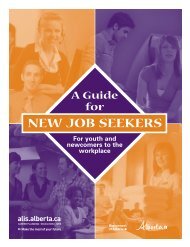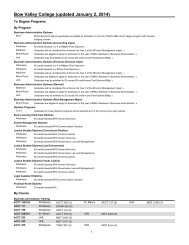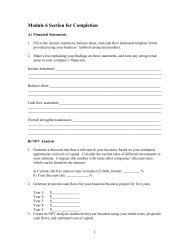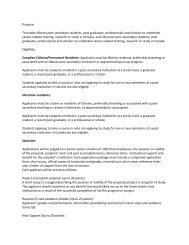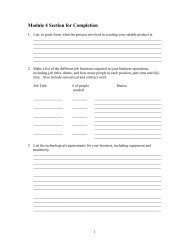Job Smart: Tips for Staying Employed - ALIS - Government of Alberta
Job Smart: Tips for Staying Employed - ALIS - Government of Alberta
Job Smart: Tips for Staying Employed - ALIS - Government of Alberta
Create successful ePaper yourself
Turn your PDF publications into a flip-book with our unique Google optimized e-Paper software.
<strong>Job</strong> <strong>Smart</strong><br />
><strong>Tips</strong> <strong>for</strong> staying employed
Career Practitioners and Educators<br />
This book will help your clients succeed at work if they are having trouble maintaining<br />
employment. It will help them<br />
• understand the importance that personal qualities have on keeping work<br />
• explore the skills, knowledge and attitude necessary to maintain work<br />
• determine what might interfere with reaching their goals<br />
• explore strategies <strong>for</strong> problem-solving<br />
• adopt behaviours that reflect a positive attitude about themselves and their work<br />
• understand the value <strong>of</strong> taking responsibility <strong>for</strong> their actions<br />
For more in<strong>for</strong>mation on job maintenance skills, check out Workability: What you need<br />
to get and keep a job at alis.alberta.ca/publications.<br />
For tips to help your clients succeed at work, visit alis.alberta.ca/tips. Go to <strong>Tips</strong> by<br />
Topic and click On the <strong>Job</strong>—Being Successful and On the <strong>Job</strong>—Management.<br />
Catalogue Item # 505240<br />
This publication is available to view or order online at alis.alberta.ca/publications.<br />
Additional copies can be ordered from the Learning Resources Centre by telephone at<br />
780-427-5775 or by fax at 780-422-9750.<br />
For copyright in<strong>for</strong>mation, contact:<br />
<strong>Alberta</strong> Employment and Immigration<br />
Career and Workplace Resources<br />
Telephone: 780-422-1794<br />
Fax: 780-422-5319<br />
Email: info@alis.gov.ab.ca<br />
© 2003, <strong>Government</strong> <strong>of</strong> <strong>Alberta</strong>, <strong>Alberta</strong> Employment and Immigration<br />
This material may be used, reproduced, stored or transmitted <strong>for</strong> non-commercial purposes. However, Crown copyright is to be<br />
acknowledged. It is not to be used, reproduced, stored or transmitted <strong>for</strong> commercial purposes without written permission from the<br />
<strong>Government</strong> <strong>of</strong> <strong>Alberta</strong>, <strong>Alberta</strong> Employment and Immigration. This publication is not <strong>for</strong> resale unless licensed with <strong>Government</strong> <strong>of</strong><br />
<strong>Alberta</strong>, <strong>Alberta</strong> Employment and Immigration. Every reasonable ef<strong>for</strong>t has been made to identify the owners <strong>of</strong> copyright material<br />
reproduced in this publication and to comply with Canadian copyright law. The publisher would welcome any in<strong>for</strong>mation regarding<br />
errors or omissions.<br />
<strong>Government</strong> <strong>of</strong> <strong>Alberta</strong>, <strong>Alberta</strong> Employment and Immigration publications may contain or reference publications, trademark, patent or<br />
copyright held by third parties (“third party material”), identified with a credit to the source. This does not grant the user a licence or<br />
right to that third party material. Users who wish to reproduce any third party material in this publication should seek permission from<br />
that third party.<br />
In<strong>for</strong>mation in this publication was accurate, to the best <strong>of</strong> our knowledge, at the time <strong>of</strong> printing. However, legislation, labour<br />
market in<strong>for</strong>mation, websites and programs are subject to change, and we encourage you to confirm with additional sources <strong>of</strong><br />
in<strong>for</strong>mation when making career, education and employment decisions.<br />
The Province <strong>of</strong> <strong>Alberta</strong> is working in partnership with the <strong>Government</strong> <strong>of</strong> Canada to provide employment support programs and services.<br />
These benefits and measures are funded, in whole or in part, by the <strong>Government</strong> <strong>of</strong> Canada from the Employment Insurance Account.<br />
ISBN 978-0-7785-7307-4<br />
02/2003–65M<br />
09/2006–30M<br />
02/2009–27M<br />
02/2009–23M<br />
Cert no. SW-COC-002083<br />
25%
Table <strong>of</strong> Contents<br />
Introduction 2<br />
Is this book <strong>for</strong> you? 2<br />
Why does keeping a job matter? 2<br />
Becoming job smart—what does it mean? 3<br />
What do employers want? 4<br />
Why being a valued employee matters 5<br />
Assess your personal and work skills 8<br />
Making positive changes 10<br />
How are your problem-solving skills? 11<br />
Is a personal problem preventing you from keeping a job? 16<br />
Who can help? 20<br />
Is something stopping you from making a change? 22<br />
Don't get discouraged 22<br />
Are you happy in your job? 23<br />
What do employees want? 24<br />
Contribute to a positive workplace 25<br />
• Develop positive workplace relationships 25<br />
• Put your best foot <strong>for</strong>ward 26<br />
• Communicate with confidence 26<br />
• Stay positive 27<br />
Finding a good fit with an employer 29<br />
Resources 30<br />
© <strong>Government</strong> <strong>of</strong> <strong>Alberta</strong>, <strong>Alberta</strong> Employment and Immigration
Introduction<br />
Congratulations! The job interview went well and you got the job. Now you want<br />
to make sure you keep it! You will want to continue making the good impression you did<br />
during the job interview because keeping the job is just as important as getting it.<br />
Is this book <strong>for</strong> you?<br />
<strong>Job</strong> <strong>Smart</strong>: <strong>Tips</strong> <strong>for</strong> staying employed is a step-by-step guide to help you keep your job.<br />
It will:<br />
• answer your questions about what your employer expects <strong>of</strong> you<br />
• provide exercises to help you evaluate yourself as an employee<br />
• give you advice on how to overcome some common workplace challenges.<br />
To find out if this book is <strong>for</strong> you, ask yourself these questions:<br />
• Have I had several jobs in the past that didn't last very long?<br />
• Have I left a job because <strong>of</strong> a disagreement with a supervisor or co-worker?<br />
• Have I received feedback about having a poor attitude, not being on time <strong>for</strong> work or<br />
not being a team player?<br />
• Have I had to turn down work or leave a new job because <strong>of</strong> personal issues in my life<br />
(e.g., childcare, transportation, substance abuse or health issues)?<br />
• Do I find jobs where I feel over- or underqualified?<br />
• Do I feel burnt-out, scared or unsure <strong>of</strong> my abilities at work?<br />
• Do I see a pattern repeating in my employment history but feel unable to change it?<br />
If you answered "yes" to any <strong>of</strong> these questions, this book is <strong>for</strong> you.<br />
Why does keeping a job matter?<br />
We all know why employers want employees they can keep. If they find hardworking,<br />
loyal employees, the work gets done well and <strong>of</strong>ten faster—and that means continued<br />
business <strong>for</strong> them. But this book is about you, the employee. So, why does keeping a job<br />
matter to you? The following are some strong reasons to keep a job. Which ones are<br />
important to you?<br />
2 © <strong>Government</strong> <strong>of</strong> <strong>Alberta</strong>, <strong>Alberta</strong> Employment and Immigration
• A sense <strong>of</strong> pride.<br />
Doing a job well can increase your confidence in yourself and in your skills. And<br />
knowing you contribute to a team can give you a sense <strong>of</strong> accomplishment and pride.<br />
• A steady paycheque.<br />
It's no secret that knowing where your next paycheque is coming from is a major<br />
reason <strong>for</strong> keeping a job. You need money to support yourself and your family, so a<br />
regular paycheque is very important. Keeping a job can lead to financial<br />
independence and less stress about money problems.<br />
• Increased chance <strong>of</strong> job advancement.<br />
Keeping a job <strong>for</strong> months or years gives you time to learn to do the job well and<br />
prove that you can be an asset to the business. This could lead to a promotion, new<br />
job responsibilities or an increase in your salary.<br />
• A good reference from your employer if you decide to change jobs.<br />
In today's labour market, people change jobs more than ever be<strong>for</strong>e. Working at one<br />
company <strong>for</strong> several years looks good on a résumé. And, chances are, if your employer<br />
has kept you on that long, he or she will give you a positive recommendation if you<br />
decide it's time to try something new.<br />
• Opportunities to develop personal or technical skills.<br />
Keeping a job can also mean opportunities to learn new skills. This<br />
could mean on-the-job training or attending a workshop. If you've<br />
been working in your job <strong>for</strong> some time, your employer is more<br />
likely to invest time or money in your training.<br />
Becoming job smart—what does it mean?<br />
Employees who are job smart understand what it takes to keep a job. They respect their<br />
employers and co-workers and do their part to make their workplace a positive one. Being<br />
job smart also provides a sense <strong>of</strong> security. That doesn't necessarily mean you'll have this<br />
job <strong>for</strong> the rest <strong>of</strong> your life, but it does mean you will have the skills to keep a job. And if<br />
this job ends, you can be confident in your ability to find and keep a job again.<br />
The next few pages are designed to help you identify the job smart<br />
skills you have and those you may choose to work on.<br />
© <strong>Government</strong> <strong>of</strong> <strong>Alberta</strong>, <strong>Alberta</strong> Employment and Immigration<br />
3
Employers<br />
Employers<br />
What do<br />
want?<br />
Do you know what employers expect from you? Below are 13 qualities employers<br />
say make a valued employee. Valued employees:<br />
1. have good attendance records. They show up <strong>for</strong> every shift they are scheduled <strong>for</strong>.<br />
2. are on time, whether it's showing up <strong>for</strong> work, returning from breaks, going to staff<br />
meetings or completing tasks.<br />
3. call if they know they will be late or if they are unable to make it in to work—but they<br />
don't abuse this privilege.<br />
4. dress appropriately <strong>for</strong> the type <strong>of</strong> work they are hired to do.<br />
5. have a positive attitude and show enthusiasm about their job.<br />
6. are prepared. They come to work willing to do the job, pay attention and follow<br />
directions.<br />
7. work safely and are healthy. They come to work substance-free. This includes not<br />
using alcohol or drugs and making sure that over-the-counter medications don't<br />
interfere with their ability to do their job.<br />
8. ask if they don't understand something.<br />
9. are open to learning new personal and technical skills. This includes taking<br />
responsibility <strong>for</strong> mistakes.<br />
10. are team players. They work well with others to achieve a common goal.<br />
11. take initiative. If they see that something needs to be done, they do it. They don’t wait<br />
<strong>for</strong> someone to ask them to do it.<br />
12. are honest and trustworthy.<br />
13. are knowledgeable about the company.<br />
How many <strong>of</strong> these qualities describe you at work? Are there any areas where you could<br />
improve? Write them here so you can refer back to this section later.<br />
You may think these qualities only matter to your employer. But they don't. They<br />
matter to you too. The following chart explains how.<br />
4 © <strong>Government</strong> <strong>of</strong> <strong>Alberta</strong>, <strong>Alberta</strong> Employment and Immigration
Why being a valued employee matters<br />
Valued<br />
employees ...<br />
Have good attendance<br />
records. They show up <strong>for</strong><br />
every shift they are<br />
scheduled <strong>for</strong>.<br />
Are on time, whether it's<br />
showing up <strong>for</strong> work,<br />
returning from breaks,<br />
going to staff meetings or<br />
completing tasks.<br />
Call if they know they will<br />
be late or if they are unable<br />
to make it in to work—but<br />
they don't abuse this<br />
privilege.<br />
Dress appropriately <strong>for</strong> the<br />
type <strong>of</strong> work they are hired<br />
to do.<br />
Why it matters<br />
to employers ...<br />
If you don't show up <strong>for</strong><br />
work, it puts pressure on<br />
your employer to find<br />
someone to cover your<br />
shift. Or, your employer<br />
may think you've<br />
abandoned your job and<br />
may replace you.<br />
Time is money. Being late<br />
10 minutes each day may<br />
not seem like much to you,<br />
but in a week, that equals<br />
an hour <strong>of</strong> work time.<br />
Delays in production and<br />
service can cause the<br />
business to lose customers<br />
or even close.<br />
Calling if you will be late or<br />
absent allows your<br />
supervisor time to find a<br />
replacement or re-distribute<br />
work.<br />
What employees wear and<br />
how they present<br />
themselves to customers<br />
and clients reflects on the<br />
business. By looking<br />
pr<strong>of</strong>essional, you're helping<br />
your employer and the<br />
business to be seen as<br />
pr<strong>of</strong>essional.<br />
Why it matters<br />
to you ...<br />
Having a good attendance<br />
record shows you care<br />
about keeping your job. It<br />
also shows you are<br />
dependable.<br />
Being on time and meeting<br />
deadlines can help you<br />
keep your job.<br />
Calling if you will be late or<br />
absent is just good<br />
manners. It shows you care<br />
about your employer and<br />
co-workers and want to<br />
help them prepare <strong>for</strong> your<br />
absence.<br />
Every day you make<br />
impressions on people.<br />
Show that you are<br />
confident and care about<br />
yourself by wearing<br />
clothing that is clean and<br />
appropriate <strong>for</strong> your job.<br />
© <strong>Government</strong> <strong>of</strong> <strong>Alberta</strong>, <strong>Alberta</strong> Employment and Immigration<br />
5
Valued<br />
employees ...<br />
Have a positive attitude and<br />
show enthusiasm about<br />
their job.<br />
Are prepared. They come<br />
to work willing to do the<br />
job, pay attention and<br />
follow directions.<br />
Work safely and are<br />
healthy. They come to<br />
work substance-free. This<br />
includes not using alcohol<br />
or drugs and making sure<br />
that over-the-counter<br />
medications don't interfere<br />
with their ability to do their<br />
job.<br />
Ask if they don't<br />
understand something.<br />
Why it matters<br />
to employers ...<br />
Positive attitudes contribute<br />
to a positive work<br />
environment <strong>for</strong> everyone.<br />
Like your clothing, your<br />
attitude reflects on your<br />
employer and the business.<br />
If you have a negative<br />
attitude, customers and<br />
clients may see you—and<br />
the organization—as<br />
unpr<strong>of</strong>essional and take<br />
their business elsewhere.<br />
Employers value employees<br />
who are prepared and get<br />
their work done. That's<br />
why they hired you.<br />
Employees who use<br />
substances are an important<br />
workplace health and safety<br />
concern <strong>for</strong> the employer.<br />
They are a danger to<br />
themselves and to their coworkers.<br />
Their behaviour<br />
leads to lost time in<br />
productivity and in injuries<br />
that result from their<br />
carelessness.<br />
Employers would prefer you<br />
asked and did the job right<br />
the first time rather than do<br />
the task wrong and find out<br />
how to do it right later.<br />
Time is money.<br />
6 © <strong>Government</strong> <strong>of</strong> <strong>Alberta</strong>, <strong>Alberta</strong> Employment and Immigration<br />
Why it matters<br />
to you ...<br />
We all like working with<br />
people who are positive<br />
about their work and the<br />
people around them.<br />
By showing you can pay<br />
attention and follow<br />
directions, you're proving<br />
you can do the job. This<br />
can increase your<br />
confidence in your ability<br />
to become a valued<br />
member <strong>of</strong> the work team.<br />
Being substance-free makes<br />
it easier to focus on tasks<br />
and keeps you and your coworkers<br />
safe on the job.<br />
By asking questions, you<br />
show you're interested and<br />
want to do a good job.
Valued<br />
employees ...<br />
Are open to learning new<br />
personal and technical<br />
skills. This includes taking<br />
responsibility <strong>for</strong> mistakes.<br />
Are team players. They<br />
work well with others to<br />
achieve a common goal.<br />
Take initiative. If they see<br />
that something needs to be<br />
done, they do it. They don't<br />
wait <strong>for</strong> someone to ask<br />
them to do it.<br />
Why it matters<br />
to employers ...<br />
Change is constant—<br />
whether it's a new<br />
computer system or an idea<br />
about how to do things<br />
differently. Employers need<br />
workers who are willing to<br />
learn and adapt to change.<br />
Taking responsibility <strong>for</strong><br />
mistakes shows that you are<br />
willing to learn the right<br />
way to do the job.<br />
Employees who work well<br />
together ensure that tasks<br />
are completed faster and<br />
<strong>of</strong>ten more efficiently.<br />
Employers appreciate<br />
employees who <strong>of</strong>fer to<br />
help. With so much work<br />
to be done, employers need<br />
people who will act rather<br />
than wait to be told what to<br />
do.<br />
Are honest and trustworthy. Employers have to trust<br />
employees with their<br />
business. That means<br />
handling money, opening<br />
and closing the shop, or<br />
just getting things done<br />
when the employer is not<br />
there. They need to know<br />
the people they hire are<br />
reliable.<br />
Are knowledgeable about<br />
the company.<br />
Employees represent the<br />
company to the public so<br />
employers value staff who<br />
are able to speak positively<br />
and knowledgeably about<br />
the company to others.<br />
Why it matters<br />
to you ...<br />
Learning is a survival skill.<br />
Not only can learning new<br />
skills help you succeed in<br />
your current job but<br />
knowing the latest skills can<br />
also help you if you decide<br />
to look <strong>for</strong> a new job.<br />
Sometimes we learn by trial<br />
and error—but we only<br />
learn from our mistakes if<br />
we take responsibility <strong>for</strong><br />
them.<br />
Being part <strong>of</strong> a team is a<br />
good feeling. It also<br />
contributes to a more<br />
pleasant work environment<br />
<strong>for</strong> everyone.<br />
Sometimes taking initiative<br />
will mean you get to do<br />
new tasks that you really<br />
like to do. Or it might<br />
mean that you get<br />
something done when<br />
things are slow so that the<br />
busy times are less stressful.<br />
We <strong>of</strong>ten expect to be<br />
treated in the way we treat<br />
others. Wouldn't you want<br />
others to be honest with<br />
you? Don't you want to be<br />
able to trust them?<br />
Knowing your role and how<br />
you fit into the company<br />
can help you do your job<br />
better and understand the<br />
pressures that other people<br />
are facing.<br />
© <strong>Government</strong> <strong>of</strong> <strong>Alberta</strong>, <strong>Alberta</strong> Employment and Immigration<br />
7
Assess your personal and work skills<br />
Knowing what employers expect <strong>of</strong> you is Step One. Rating yourself as an employee is Step<br />
Two. Try this exercise. Read each statement and check the response that best describes you.<br />
At work, I consider myself to be:<br />
Yes Sometimes No<br />
8 © <strong>Government</strong> <strong>of</strong> <strong>Alberta</strong>, <strong>Alberta</strong> Employment and Immigration<br />
Hardworking<br />
I get tasks done on time.<br />
If business or my workload slows down, I look <strong>for</strong> other<br />
tasks I can do until things get busy again.<br />
Enthusiastic<br />
I have a positive attitude at work.<br />
I am eager to learn new skills and tasks.<br />
I want to learn more about the organization I work <strong>for</strong>.<br />
I ask questions.<br />
Dependable<br />
I show up <strong>for</strong> every shift I am scheduled <strong>for</strong>.<br />
I get to work on time.<br />
I don't take longer breaks than I am entitled to.<br />
I finish tasks I am given.<br />
Helpful<br />
I <strong>of</strong>fer help if others need it.<br />
I look <strong>for</strong> ways to be part <strong>of</strong> the team.<br />
Showing up is important—An Employer's Story<br />
Amanufacturer in Red Deer, who hires unskilled workers and trains them on<br />
the job, takes pride in recruiting young workers and <strong>of</strong>fering them their first well-paying<br />
job.<br />
"My biggest frustration is people who don't show up," he said. "I hired one young man<br />
who had real talent, but he missed 29 days out <strong>of</strong> his first 67 days on the job. He left<br />
me with no choice but to let him go. I'm pretty flexible but how could we work<br />
anything out if he didn't show up?"
Yes Sometimes No<br />
Friendly<br />
I make an ef<strong>for</strong>t to meet new people.<br />
I enjoy talking with co-workers during breaks or at lunch.<br />
I provide polite and respectful service to my customers.<br />
Able to work well with others<br />
I am a team player.<br />
I know how to work in a team to get the job done.<br />
I treat my co-workers with respect.<br />
Pr<strong>of</strong>essional<br />
I dress appropriately <strong>for</strong> my job.<br />
I speak positively about my employer, my co-workers<br />
and customers.<br />
I am honest and trustworthy.<br />
I am clean and well groomed when I arrive at work.<br />
If you answered mostly "yes," you have a good idea <strong>of</strong> what it takes to stay employed.<br />
Do you think your employer would agree with your self-assessment?<br />
If you answered "sometimes" to any <strong>of</strong> the work or personal skills above, then you're on<br />
the right track. Try doing those things more <strong>of</strong>ten so you can check "yes" next time.<br />
If you answered "no" to any <strong>of</strong> the skills above, take a closer look and ask yourself why.<br />
How is this affecting your work? If you've had trouble keeping a job in the past, could<br />
this be a reason?<br />
Importance <strong>of</strong> a positive attitude—An Employer's Story<br />
“Education,<br />
experience, knowledge and personal suitability are factors our company<br />
takes into account when we hire tradespeople, construction workers and support staff,"<br />
said the manager <strong>of</strong> transportation services <strong>for</strong> a utilities company in <strong>Alberta</strong>.<br />
"An individual with good personal skills can always learn the technical side <strong>of</strong> the job.<br />
The employees who stand out the most have great attitudes toward the company, are<br />
com<strong>for</strong>table working with minimal supervision, are safety conscious, and are full <strong>of</strong><br />
energy."<br />
© <strong>Government</strong> <strong>of</strong> <strong>Alberta</strong>, <strong>Alberta</strong> Employment and Immigration<br />
9
Making<br />
Positive<br />
changes<br />
Now that you've identified some areas where you may want to improve, identify<br />
the reason why that skill is a challenge <strong>for</strong> you. Write down the areas where you<br />
answered "sometimes" or "no" under "Personal or Work Skill." Think about why that's<br />
true <strong>for</strong> you and explain in more detail under "Reason."<br />
Example:<br />
Personal or Work Skill Reason<br />
It is a challenge <strong>for</strong> me to<br />
show up <strong>for</strong> every shift.<br />
I have children and my child care<br />
provider is unreliable.<br />
Use the spaces below.<br />
Personal or Work Skill Reason<br />
It is a challenge <strong>for</strong> me to<br />
It is a challenge <strong>for</strong> me to<br />
It is a challenge <strong>for</strong> me to<br />
Keep these in mind as you read the next section "How are your problem-solving skills?"<br />
It's designed to help you come up with ways to face workplace challenges and improve<br />
your job smart skills.<br />
10 © <strong>Government</strong> <strong>of</strong> <strong>Alberta</strong>, <strong>Alberta</strong> Employment and Immigration
How are your problem-solving skills?<br />
There's no such thing as a job without challenges. It's how you choose to deal with<br />
those challenges that matter. Below are some examples <strong>of</strong> challenges that you could<br />
face on the job. How would you handle the situation? Write down your answer on the<br />
lines below each example and see how it compares to our suggestions.<br />
Sample Challenge 1 Late <strong>for</strong> work<br />
Mark has been having trouble getting to work on time <strong>for</strong> the last few weeks. He does<br />
his best to get his three kids <strong>of</strong>f to day care and school each day, but sometimes things<br />
happen. Like when his four-year-old daughter had a tantrum at the breakfast table and<br />
spilled her juice down the front <strong>of</strong> his shirt. Not a good start to the day. Because he had<br />
to change clothes, Mark ended up being 10 minutes late <strong>for</strong> work—<strong>for</strong> the second time<br />
this week. What could he do?<br />
Possible Solution:<br />
Some suggestions:<br />
Mark could try to feed the kids be<strong>for</strong>e he gets dressed so there is no chance <strong>of</strong> spills<br />
getting on his work clothes. This could mean getting up 15 minutes earlier. He also<br />
might want to keep a clean shirt at work <strong>for</strong> emergencies. Mark could also talk to his<br />
supervisor. By letting his supervisor know he is a single dad and is responsible <strong>for</strong><br />
getting his kids <strong>of</strong>f to school in the morning, it helps his supervisor understand why he<br />
is sometimes late. Without an explanation, his supervisor might think he doesn't care<br />
about being on time. Mark could describe what a typical morning is like <strong>for</strong> him and let<br />
his supervisor know how much those extra minutes in the morning would mean to<br />
him.<br />
Maybe there's a way Mark's supervisor can change Mark's work schedule to have him<br />
start later in the morning or perhaps work later afternoon or evening shifts. Mark and<br />
his supervisor might be able to work out an arrangement where he could come in 15<br />
minutes later in the morning and stay 15 minutes later at the end <strong>of</strong> the day or take a<br />
shorter lunch break.<br />
© <strong>Government</strong> <strong>of</strong> <strong>Alberta</strong>, <strong>Alberta</strong> Employment and Immigration<br />
11
Sample Challenge 2 Problem with a co-worker<br />
Lien is having a problem with a co-worker. They just don't seem to get along. Lien gets<br />
upset when her co-worker points out her mistakes to everyone nearby, like the time<br />
Lien was trying to use the cash register and it got jammed. Lien believes her co-worker<br />
treats her this way because she doesn't like her. What could she do?<br />
Possible Solution:<br />
Some suggestions:<br />
Lien could talk to her co-worker about her concerns. She could pick a time when they both<br />
have a private moment to talk. It's important <strong>for</strong> Lien not to yell or get angry. That will<br />
only make the problem worse. She could tell her co-worker how she felt when she spoke<br />
loudly about the cash register. Lien shouldn't blame the person, but she needs to explain<br />
her feelings in a polite but firm way. She could try something like: "I felt embarrassed when<br />
you were fixing the cash register and talking loudly about what I had done to jam it." After<br />
talking with the co-worker, if the problem still exists, Lien could discuss her concern with<br />
her supervisor. She could tell her supervisor that she tried to resolve the problem with the<br />
co-worker and then let her supervisor handle the situation from there.<br />
Sample Challenge 3<br />
Too much work to do<br />
Antonio enjoys his job in the mailroom but lately he's been feeling swamped. Whenever<br />
he turns around, someone needs a letter tracked down, someone has a rush delivery or<br />
more mail comes in and needs to be sorted and delivered. He's trying his best to keep up<br />
but it's been getting hard to keep on top <strong>of</strong> everything. In fact, some things have slipped<br />
through the cracks. Antonio feels terrible and wants to do better. But he can't keep<br />
working through his lunch break to get things done and staying up at night thinking<br />
about things he may have <strong>for</strong>gotten to do. What could he do?<br />
Possible Solution:<br />
Some suggestions:<br />
Antonio could talk to his supervisor. Being busy is one thing, but being constantly<br />
overloaded might indicate a problem. If he's stressed out at work and rushing to get<br />
things done, a mistake could happen. It's natural to worry about his supervisor's<br />
reaction, but Antonio should explain that he can do the job but the pace is too difficult<br />
<strong>for</strong> one person to manage. Most employers will be happy he came to them be<strong>for</strong>e a<br />
major problem occurred and will try to improve the work environment. That could<br />
mean watching Antonio do his work and making some suggestions, reassigning some<br />
tasks to another person or hiring more help in the mailroom at busier times.<br />
12 © <strong>Government</strong> <strong>of</strong> <strong>Alberta</strong>, <strong>Alberta</strong> Employment and Immigration
Sample Challenge 4 Dealing with a supervisor who isn't easy to talk to<br />
Karen is having trouble talking to her supervisor about how she feels about her job and<br />
about their relationship. She doesn't think her supervisor likes her work. Although<br />
Karen’s tried to talk in<strong>for</strong>mally to her about the problem several times, her supervisor<br />
never seems to have the time or interest. What could Karen do?<br />
Possible Solution:<br />
Some suggestions:<br />
Since Karen has tried to talk to her supervisor several times and had no success, perhaps<br />
she needs to be more assertive. The problem will only become bigger if she doesn't do<br />
something about it now. She could try to schedule a meeting with her supervisor<br />
instead <strong>of</strong> trying to speak in<strong>for</strong>mally. If meeting with her supervisor doesn't improve<br />
things, Karen could try talking to her co-workers to see if they have any ideas about<br />
how she could work better with her supervisor. She could also try talking to the<br />
manager <strong>of</strong> the department or perhaps someone in human resources if she is unable to<br />
resolve the situation herself. If Karen still sees no change, she may want to think about<br />
moving to a position where she reports to someone else.<br />
Sample Challenge 5<br />
Having trouble keeping up with new technology<br />
Chris has just re-entered the work<strong>for</strong>ce after a long period <strong>of</strong> time and he's having<br />
trouble keeping up with the new technology. Computers, computers, computers. How<br />
will he ever learn it all? He's starting to feel stressed and it's beginning to affect his<br />
work. What could he do?<br />
Possible Solution:<br />
Some suggestions:<br />
Chris could talk to his supervisor about some extra training courses he may be able to<br />
take to upgrade his skills. By taking ownership <strong>of</strong> the problem and coming up with a<br />
solution, his supervisor will see that Chris is sincere about learning the skills he needs<br />
to do the job more effectively.<br />
© <strong>Government</strong> <strong>of</strong> <strong>Alberta</strong>, <strong>Alberta</strong> Employment and Immigration<br />
13
Sample Challenge 6 Asking <strong>for</strong> time <strong>of</strong>f work <strong>for</strong> a personal issue<br />
Maria's last employer fired her <strong>for</strong> abandoning her job. She didn't mean to abandon it—<br />
in fact she didn't think that she had. Maria comes from a large Aboriginal family in<br />
northern <strong>Alberta</strong> and when someone from home dies, she is expected to attend the<br />
funeral. Traditional funerals in her community can last <strong>for</strong> days and that <strong>of</strong>ten doesn't<br />
include travel time. Recently her uncle passed away. What could Maria do to make sure<br />
she doesn't lose this job?<br />
Possible Solution:<br />
Some suggestions:<br />
Maria could ask her supervisor about the policy regarding bereavement leave to understand<br />
who is considered an immediate relative and the length <strong>of</strong> time allowed <strong>for</strong> leave. She<br />
might be able to negotiate the length <strong>of</strong> time <strong>of</strong>f using a combination <strong>of</strong> bereavement<br />
leave, holiday time or unpaid time. Or she might decide which aspect <strong>of</strong> the funeral (the<br />
wake, the service or the reception) she could take part in. Maria could explain to her family<br />
the importance <strong>of</strong> this job to her and her family. She could tell them that her employer is<br />
showing respect <strong>for</strong> her and her family by giving her time <strong>of</strong>f and that she also needs to<br />
show respect to her employer by not taking too much time. She could explain that she<br />
needs to balance her personal life and her work life. Maria may be able to show respect and<br />
help her family members in other ways, such as sending flowers, food or money <strong>for</strong> the<br />
service instead <strong>of</strong> personally attending.<br />
There's no such thing as a job without challenges.<br />
It's how you choose to deal with those challenges<br />
that matters.<br />
14 © <strong>Government</strong> <strong>of</strong> <strong>Alberta</strong>, <strong>Alberta</strong> Employment and Immigration
Sample Challenge 7 Dealing with sexual harassment<br />
Verna's supervisor was too friendly to all the women at work. He stood too close to<br />
them and touched them in inappropriate ways. Her co-workers warned her about him<br />
when she started. One night when she was working late he touched her in a way that<br />
made her feel uncom<strong>for</strong>table. He said if she told anyone she could lose her job. What<br />
could Verna do?<br />
Possible Solution:<br />
Some suggestions:<br />
Verna shouldn't ignore the way she is feeling. She should tell her boss to stop and let<br />
him know that if he continues she will report him to the manager, the union or the<br />
employee association. She could even write him a letter telling him to stop and keep a<br />
copy <strong>of</strong> the letter <strong>for</strong> herself in case she chooses to file a complaint with the <strong>Alberta</strong><br />
Human Rights and Citizenship Commission. Her complaint must be made within 12<br />
months <strong>of</strong> the alleged incident or the Commission will be unable to investigate.<br />
If you need to make a complaint...<br />
Some challenges in the workplace can be very serious and should be dealt with as soon<br />
as possible. If you need to make a complaint, remember that some laws and regulations are<br />
time-sensitive, which means that you only have a certain number <strong>of</strong> days to make a<br />
complaint. The people in organizations such as unions, employee associations, Employment<br />
Standards <strong>of</strong>fices and the <strong>Alberta</strong> Human Rights and Citizenship Commission must follow<br />
those guidelines. You may be unable to pursue a complaint if you allow these deadlines to<br />
pass. For more in<strong>for</strong>mation on these organizations, see the Resource section at the end <strong>of</strong> this<br />
book.<br />
© <strong>Government</strong> <strong>of</strong> <strong>Alberta</strong>, <strong>Alberta</strong> Employment and Immigration<br />
15
Is a personal problem preventing you<br />
from keeping a job?<br />
Sometimes the challenges we face in our personal lives can affect our jobs. Anger<br />
management problems, substance abuse, and lack <strong>of</strong> child care or transportation are<br />
some examples. To determine if a personal problem is preventing you from keeping a<br />
job, start by asking yourself these questions:<br />
• Have you recently had an outburst <strong>of</strong> anger at work? Do you want help to control your<br />
temper?<br />
• Do you have a personal issue that is causing you to be late or absent from your job on<br />
a regular basis (e.g. drug or alcohol use, problems arranging child care or trouble<br />
finding transportation to work)?<br />
• Do you suffer from depression or another medical condition that is affecting your job?<br />
• Do you feel pressure from debts piling up or from exceptional or unplanned expenses?<br />
These problems can be serious. If a personal problem is affecting your job, now is the<br />
time to do something about it.<br />
Where should you start?<br />
First, consider improving the situation on your own. Try these steps:<br />
• Take a minute to relax. Take a couple <strong>of</strong> deep breaths. This will help slow your heart<br />
rate and you will begin to calm down.<br />
• Think about the problem. Write it down if that helps.<br />
• Brainstorm some possible solutions. You might want to ask a friend or family member<br />
<strong>for</strong> help.<br />
• Think about each solution. Can you see yourself doing it? If not, why not?<br />
• Think about the good and bad points <strong>of</strong> each solution.<br />
• Choose one solution to try first.<br />
• Break it down into smaller steps so you can see how the plan will work.<br />
• Take action, one step at a time.<br />
For example, let's say you found a great job but it's outside <strong>of</strong> the city you live in. It<br />
would take 20 minutes to get there by car, but that's the problem—you don't have a car.<br />
Step One:<br />
Relax. Try the deep breathing we mentioned.<br />
Step Two:<br />
Think about the problem and write it down: I found a great job but I don't have<br />
transportation to get there.<br />
16 © <strong>Government</strong> <strong>of</strong> <strong>Alberta</strong>, <strong>Alberta</strong> Employment and Immigration
Step Three:<br />
Brainstorm possible solutions. Examples:<br />
• Research buses and bus routes in your area.<br />
• Borrow a car from a friend or family member.<br />
• Ask the employer how he or she gets to work.<br />
• Ask the employer if there are any co-workers who live in your area that you may be<br />
able to arrange to carpool with.<br />
• See if there is a neighbour, friend or family member you could carpool with.<br />
Step Four:<br />
Make a list <strong>of</strong> good and bad points about the solutions you came up with. For example:<br />
• For borrowing a car from a friend or family member:<br />
Good: You can drive yourself to work and don't have to rely on someone else.<br />
Bad: You may not be able to relax knowing the car does not belong to you.<br />
• For carpooling with a co-worker:<br />
Good: You get to work. You make a new friend. You save on gas between the<br />
two <strong>of</strong> you. Carpooling is better <strong>for</strong> the environment.<br />
Bad: You could have to walk or take a bus in the cold to get to your meeting<br />
place each morning.<br />
Step Five:<br />
Choose one solution to try first. For example, you decide to see if it is possible to<br />
carpool with a co-worker who lives nearby.<br />
Step Six:<br />
Break down the solution into smaller steps so you can see how the plan will work.<br />
For example:<br />
• Talk to your co-worker about the idea <strong>of</strong> carpooling. Make the idea attractive by<br />
<strong>of</strong>fering to pay half the money <strong>for</strong> gas. Agree to re-evaluate the agreement at a later<br />
date—<strong>for</strong> example a month from now—to make sure this arrangement still works <strong>for</strong><br />
both <strong>of</strong> you.<br />
• If the co-worker agrees, decide on a place and time that is convenient to meet.<br />
• Test your route to the meeting place the night be<strong>for</strong>e to make sure you will be there<br />
on time and won't miss your ride.<br />
• Arrange to call the co-worker in the morning to let him or her know you will be at<br />
the meeting place at the agreed time.<br />
• Investigate other options throughout your month-long trial period in case this<br />
arrangement doesn't work out, or in case your co-worker is sick and can't pick you up<br />
one morning. Remember, you still need a back-up plan so you can make it to work.<br />
Step Seven:<br />
Take action.<br />
© <strong>Government</strong> <strong>of</strong> <strong>Alberta</strong>, <strong>Alberta</strong> Employment and Immigration<br />
17
Now that you know the steps to problem solving, think back to the personal or work<br />
skills you wrote down at the beginning <strong>of</strong> this section. How can you use the steps to<br />
help you face your workplace challenge?<br />
Example:<br />
Personal or Work Skill Reason Solution<br />
It is a challenge <strong>for</strong> me to show<br />
up <strong>for</strong> every shift.<br />
I have children and my child<br />
care provider is unreliable.<br />
List your challenges and reasons, this time with solutions.<br />
Personal or Work Skill Reason Solution<br />
It is a challenge <strong>for</strong> me to<br />
It is a challenge <strong>for</strong> me to<br />
It is a challenge <strong>for</strong> me to<br />
You're on your way to solving the problem when you:<br />
• take responsibility <strong>for</strong> personal issues<br />
• ask <strong>for</strong> help<br />
• do research<br />
• want to make a change.<br />
18 © <strong>Government</strong> <strong>of</strong> <strong>Alberta</strong>, <strong>Alberta</strong> Employment and Immigration<br />
My sister is able to look after<br />
my children after school until I<br />
pick them up after work.<br />
Good <strong>for</strong> you! Solving a problem on your own is not always easy. Feel proud and give<br />
yourself a pat on the back.
Not all personal or workplace problems can be solved alone, though. Some may be too<br />
difficult, so don't be afraid to ask <strong>for</strong> help. Start with people you trust, like your friends<br />
and family. What the problem is may determine whom you need to talk to—maybe it's<br />
your employer, a co-worker or a counsellor.<br />
Refer to the Resource section at the end <strong>of</strong> this book <strong>for</strong> more places to ask <strong>for</strong> help.<br />
Facing a personal issue head-on<br />
Hui's story<br />
Hui recently graduated from high school and moved to Lethbridge to find work.<br />
He was hired at the first job he applied <strong>for</strong>—working at one <strong>of</strong> the most popular fast<br />
food restaurants in the city. The job was perfect <strong>for</strong> him since he liked the fast pace and<br />
enjoyed working with the public. Sometimes, though, he would get angry if customers<br />
had problems with their orders or if his co-workers made mistakes and he had to take<br />
the heat. Once Hui threw a salt-shaker and it hit the wall. He didn't mean to get so<br />
angry. It just happened. Another time he yelled at a co-worker and made her cry. He<br />
apologized to her later but still felt terrible about what he did.<br />
Hui recognized his angry outbursts were beginning to affect his work, and he wanted to<br />
change. He did some research and found out about an anger management support<br />
group <strong>of</strong>fered by his local hospital. Hui began going to meetings twice a week and<br />
found it helpful to talk to other people who had difficulty controlling their tempers. He<br />
took the tips he learned at the sessions and put them into action. When faced with a<br />
stressful situation on the job, Hui learned how important it is to breathe and take a<br />
time out. It was difficult <strong>for</strong> him at first, but he soon got the hang <strong>of</strong> it and found he<br />
was able to control his outbursts.<br />
Today Hui is a much happier person because he was able to get help managing his<br />
anger. He uses the skills he learned through the support program both at work and in<br />
his personal life.<br />
Why this works<br />
Hui's job may have been on shaky ground if he hadn't recognized his outbursts at work<br />
were becoming a problem. He followed the steps we told you about earlier to solve the<br />
problem. He identified the problem, he researched solutions, and he took action by<br />
using small steps first. Today, Hui is doing well and is now an assistant manager <strong>of</strong> the<br />
restaurant.<br />
© <strong>Government</strong> <strong>of</strong> <strong>Alberta</strong>, <strong>Alberta</strong> Employment and Immigration<br />
19
Who can help<br />
If you decide to talk to your supervisor about the personal problem that is affecting<br />
your work, choose a time when your supervisor is not busy and has time to talk to you.<br />
Be prepared to discuss not only the problem but also possible solutions. Bring a list <strong>of</strong><br />
possible solutions you have come up with and let your supervisor know about any<br />
actions you have taken to improve your situation. Ask <strong>for</strong> your supervisor's help in<br />
resolving your situation.<br />
Your employer may not want to or be able to help you. Don't be discouraged if that<br />
happens. Not all employers will have the time or the interest to help you. Be brief when<br />
explaining your personal problem. In other words, don't tell your life story. Identify the<br />
problem and tell your supervisor the steps you've tried to resolve the problem and how<br />
that has helped. Then ask your supervisor <strong>for</strong> the help you would like from him or her,<br />
and explain how you think it will make a difference.<br />
You may not feel com<strong>for</strong>table talking to your supervisor if your problem is more<br />
personal (such as substance abuse or problems at home). Consider talking to a personal<br />
counsellor. Counsellors can help by <strong>of</strong>fering support, directing you to other<br />
pr<strong>of</strong>essionals or just <strong>of</strong>fering an ear to listen.<br />
There's help available. Just ask Maggie, whose story is next. She's recovering from<br />
substance abuse and knows how personal problems can make it difficult to keep a job.<br />
Today she's grateful to be working at a job she enjoys, making her own money and<br />
supporting her family.<br />
20 © <strong>Government</strong> <strong>of</strong> <strong>Alberta</strong>, <strong>Alberta</strong> Employment and Immigration
Overcoming personal challenges<br />
Maggie's story<br />
Maggie is a single mother <strong>of</strong> two who has spent most <strong>of</strong> her adult life moving<br />
from job to job—everything from working as a waitress to cleaning houses and<br />
babysitting. Finding a better paying job was <strong>of</strong>ten difficult <strong>for</strong> Maggie because she had<br />
dropped out <strong>of</strong> school in the seventh grade. And when she did find a job, the<br />
challenges <strong>of</strong> being a single mother with an addiction <strong>of</strong>ten prevented her from<br />
keeping it.<br />
Maggie wasn't happy, so she decided to make changes in her life. Her goal was to<br />
become a rehabilitation therapist, so that's just what she did. First she dealt with her<br />
substance abuse issues so that she could be successful in school. Then after completing<br />
high school, Maggie earned a college diploma in rehabilitation therapy. She soon found<br />
that the field <strong>of</strong> rehabilitation therapy was not <strong>for</strong> her and she began to feel burned<br />
out. She took some time to re-evaluate her job priorities. With the help <strong>of</strong> <strong>Alberta</strong> <strong>Job</strong><br />
Corps, Maggie was hired at an auto parts wholesaler in Edmonton. So far she's received<br />
two raises since she began working there and is very happy in her job.<br />
This is her advice <strong>for</strong> others who may be having trouble keeping a job: "Consider<br />
seeking counselling if a personal problem is preventing you from finding job success.<br />
There's nothing to be embarrassed or scared about."<br />
Why this works<br />
Maggie is succeeding at her new job because she had the courage to make some major<br />
changes in her life. First, she got help <strong>for</strong> her substance abuse. This didn't happen<br />
overnight. Sometimes it was a real struggle but she didn't give up. Then, she came up<br />
with a plan <strong>of</strong> action <strong>for</strong> the type <strong>of</strong> work she wanted and went <strong>for</strong> it. Her first choice<br />
didn't work out, but now Maggie has a job she enjoys. She supports her family, is more<br />
self-confident and has a strong sense <strong>of</strong> independence.<br />
In addition to Maggie's substance abuse problem, she also faced another barrier to<br />
finding and keeping a good job: her lack <strong>of</strong> education. Because Maggie had dropped out<br />
<strong>of</strong> school in the seventh grade, she needed to upgrade her skills and finish high school<br />
be<strong>for</strong>e she could pursue the work she wanted.<br />
For more in<strong>for</strong>mation about counselling services or education and training options,<br />
refer to the Resource section at the end <strong>of</strong> this book.<br />
© <strong>Government</strong> <strong>of</strong> <strong>Alberta</strong>, <strong>Alberta</strong> Employment and Immigration<br />
21
Is something stopping you from making a change?<br />
Now that you've identified some <strong>of</strong> the areas you may want to improve to help you<br />
keep a job, how do you feel? Are you prepared to make changes? If you're not sure, ask<br />
yourself why.<br />
If you're prepared to start making the changes to keep your job, good <strong>for</strong> you! You're<br />
ready to take action. But what if you're not ready? Maybe you don't know how to start.<br />
There are three steps to making a change:<br />
Step One: Recognize the need to change<br />
Step Two: Make a commitment to change<br />
Step Three: Take action<br />
By recognizing how your current behaviour is affecting your employment and wanting<br />
to do something about it, you've already completed the first stage <strong>of</strong> change. Now make<br />
a commitment to yourself that you are going to do what it takes to become job smart.<br />
When you're ready to take action follow the problem-solving steps explained in the<br />
previous section. Look to the people you trust <strong>for</strong> support to help you make these<br />
positive changes and ask <strong>for</strong> help when you need it.<br />
Don't get discouraged<br />
Be patient. You may not receive instant recognition once you decide to make a change.<br />
For example, if you are <strong>of</strong>ten late <strong>for</strong> work and you show up on time (or even early) <strong>for</strong><br />
one week, your employer might not notice. Hang in there. Some theorists suggest you<br />
need to repeat behaviour seven to 21 times be<strong>for</strong>e it becomes a habit. And remember,<br />
just because your supervisor doesn't say anything about you being on time doesn't<br />
mean he or she didn't notice. Besides, what's most important is that you know you're<br />
on time.<br />
If you find yourself returning to your old behaviour, it's important not to get<br />
discouraged or give up. New behaviour takes time. Think back to the reasons you<br />
wanted to change in the first place. Find new motivation and start again.<br />
Set goals <strong>for</strong> yourself. For example, if you have problems getting to work on time, set a<br />
goal to be on time <strong>for</strong> one week straight. Then try two weeks. Then a month.<br />
Another tip <strong>for</strong> staying on track? Find support from family and friends. Share your<br />
successes with them and they can <strong>of</strong>fer you the encouragement you need to continue.<br />
Reward yourself when you've reached your goal.<br />
It all comes down to this: what have you got to lose by trying? Have the courage to<br />
make a change and show your employer you deserve to keep your job. It takes work—<br />
sometimes a lot <strong>of</strong> work—but there are benefits. Think about it the next time you pay<br />
the rent or your mortgage on time, have enough money <strong>for</strong> food or clothing or are able<br />
to buy something special <strong>for</strong> your family. Isn't it worth it?<br />
22 © <strong>Government</strong> <strong>of</strong> <strong>Alberta</strong>, <strong>Alberta</strong> Employment and Immigration
Are you happy in your job?<br />
Sometimes the reason people move from job to job is that they are unhappy with the<br />
work. It could be that you are overqualified and don't find the work to be challenging.<br />
Or, it could be that you feel underqualified because you don't have the skills, the<br />
education or the training to do the job you have been hired to do. If that's the case <strong>for</strong><br />
you, maybe it's time to do some career planning.<br />
In the Resource section at the end <strong>of</strong> the book, you'll find a list <strong>of</strong> publications, websites<br />
and employment centres that can help you with your career plan. Career planning takes<br />
some work and some time to consider your options and get the appropriate training.<br />
There<strong>for</strong>e, you may need to hang on to your current job until you are ready to make a<br />
move. Also, if you do decide to move on from your current job, try to line up another<br />
job be<strong>for</strong>e you leave the one you have.<br />
Knowing when it's time to move on<br />
Eloise's story<br />
Eloise is a single mother <strong>of</strong> five who has been faced with stress in her job and in<br />
her personal life. She spent five years working as an aide <strong>for</strong> a second grade teacher, and<br />
although she always loved her work, being around children eight hours a day, five days<br />
a week proved to be too much. She wasn't happy in her job and it was affecting her<br />
personal life. So she decided to make a change.<br />
Eloise had always had an interest in business, so she enrolled in a business<br />
administration program. Today she is an administrative assistant <strong>for</strong> the provincial<br />
government and recently marked her one-year anniversary in the position. She likes her<br />
job because the work is challenging. She makes more money than she did be<strong>for</strong>e, and<br />
she has her weekends <strong>of</strong>f to spend with her children. And best <strong>of</strong> all, she has more selfesteem<br />
now.<br />
What advice does Eloise have <strong>for</strong> others who may be thinking about looking <strong>for</strong> a job<br />
they can keep? "Take a chance on finding a job that's right <strong>for</strong> you, and stay positive<br />
because good things will happen if you believe they will."<br />
Why this works<br />
Eloise is succeeding at her new job because she recognized it was time <strong>for</strong> her to find a<br />
new job. She wasn't happy working as a teacher's aide and it was beginning to affect her<br />
personal life in a negative way. Life is too short to stay in a job where you're not happy.<br />
Eloise's positive outlook and her willingness to be trained in a field <strong>of</strong> her choice helped<br />
her to get a job she finds challenging and rewarding—a job she is working hard to keep.<br />
© <strong>Government</strong> <strong>of</strong> <strong>Alberta</strong>, <strong>Alberta</strong> Employment and Immigration<br />
23
Employees What do<br />
want?<br />
Surveys show employees want a job where:<br />
• they get paid a fair wage<br />
• they feel safe<br />
• the workplace practices are fair<br />
• they are recognized <strong>for</strong> their contributions<br />
• the work is meaningful<br />
• they have the resources they need to do their work<br />
• their opinions are heard<br />
• the people are positive.<br />
How does your job rate? Answer "yes" or "no" to the following questions.<br />
Yes No<br />
Are you paid <strong>for</strong> the work you do with a regular paycheque? Is the wage<br />
rate reasonable?<br />
Do you feel safe at work? Does your employer follow safety guidelines<br />
and provide safety training to employees (e.g. conduct fire drills, provide<br />
safety manuals)?<br />
Are the workplace practices at your job fair? Are workers treated with<br />
respect?<br />
Does your supervisor recognize and thank you and your co-workers <strong>for</strong><br />
the work you do? Have you been recognized <strong>for</strong> going the extra mile on a<br />
project or finishing work be<strong>for</strong>e a deadline?<br />
Does the work you do mean something to you? Does it make a difference<br />
in your life or in the lives <strong>of</strong> others?<br />
Does your employer provide you with all the resources (equipment, tools,<br />
supplies) you need to do your job?<br />
Are you able to say what's on your mind and be heard by others? Do you<br />
feel your ideas and opinions matter to your employer?<br />
Do your supervisor and your co-workers have positive attitudes?<br />
24 © <strong>Government</strong> <strong>of</strong> <strong>Alberta</strong>, <strong>Alberta</strong> Employment and Immigration
If you didn't answer "yes" to all <strong>of</strong> the previous questions, the next section can help you<br />
find ways you can help create the type <strong>of</strong> workplace you want.<br />
Contribute to a positive workplace<br />
There are lots <strong>of</strong> ways you can help make your workplace a better place to work. Start<br />
with these ideas:<br />
• develop positive relationships with your supervisor and co-workers<br />
• put your best foot <strong>for</strong>ward<br />
• communicate with confidence<br />
• stay positive.<br />
Develop positive workplace relationships<br />
When employers say they want an employee who is a team player, they mean someone<br />
who works well with others and is com<strong>for</strong>table contributing to team ef<strong>for</strong>ts. In order to<br />
succeed at your job, one <strong>of</strong> the most important things <strong>for</strong> you to do is develop positive<br />
working relationships with your supervisor, your co-workers and your customers or<br />
clients. That doesn't mean you have to become friends with everyone you work with—if<br />
you do, consider that a bonus—but make an ef<strong>for</strong>t to be friendly and positive.<br />
Here are some tips to help you develop positive workplace relationships:<br />
• Be friendly, be polite and smile.<br />
• Listen to others when they are speaking.<br />
• Make small talk about current events or the weather, but avoid sharing personal<br />
problems or gossiping about staff or supervisors.<br />
• Offer assistance to your co-workers if they need it.<br />
• Ask <strong>for</strong> help if you need it.<br />
• Avoid complaining about your job.<br />
• Avoid dating co-workers.<br />
Sometimes you'll find that despite your best ef<strong>for</strong>ts, not everyone you work with will<br />
have a positive attitude. Don't let others bring you down. Continue to stay positive and<br />
focus on the tasks at hand.<br />
© <strong>Government</strong> <strong>of</strong> <strong>Alberta</strong>, <strong>Alberta</strong> Employment and Immigration<br />
25
Put your best foot <strong>for</strong>ward<br />
Your personal presentation is the first thing others notice about you and can set the<br />
tone <strong>for</strong> your working relationship. Remember to shower regularly, use deodorant, brush<br />
your teeth, wash and comb your hair, and have clean hands.<br />
The way you dress is also important. That doesn't mean you need to spend a <strong>for</strong>tune on<br />
a new wardrobe, but your clothes should be appropriate <strong>for</strong> the work you do. You can<br />
find good bargains at second-hand or consignment clothing stores. As long as the<br />
clothes are clean and neat, you'll make a positive impression. Remember, your employer<br />
expects you to represent the company in a positive way, so clothes that are too short or<br />
too tight should not be worn to work.<br />
Communicate with confidence<br />
Communication problems <strong>of</strong>ten lead to relationships breaking down. This includes the<br />
relationship you have with your employer and your co-workers. Knowing how to<br />
communicate effectively is an important skill to have both on and <strong>of</strong>f the job.<br />
To help yourself communicate better, follow these tips:<br />
• Relax.<br />
• Think be<strong>for</strong>e you speak.<br />
• Speak clearly and confidently.<br />
• Make eye contact with the person you are speaking to.<br />
• Smile.<br />
Listening is an equally important part <strong>of</strong> communicating effectively. To help yourself<br />
listen better, follow these tips:<br />
• Pay attention.<br />
• Show interest in what the person is saying.<br />
• Let the person who is talking finish what he or she is trying to say. In other words,<br />
don't cut them <strong>of</strong>f.<br />
• Stay focused.<br />
• Ask questions if you don't understand or if you need to clarify something.<br />
• Listen to the person's tone <strong>of</strong> voice to help you understand the message.<br />
Knowing when to be lighthearted and funny and when to be serious is also a good skill<br />
to learn. When you enter a room, take note <strong>of</strong> the atmosphere be<strong>for</strong>e making a joke.<br />
Humour is not appropriate <strong>for</strong> every situation.<br />
26 © <strong>Government</strong> <strong>of</strong> <strong>Alberta</strong>, <strong>Alberta</strong> Employment and Immigration
Stay positive<br />
Many people spend between 20 and 45 hours per week at their job, so why not make it<br />
as positive an experience as possible? Your attitude says a lot about you. In fact, a<br />
positive attitude can <strong>of</strong>ten be a determining factor in whether or not your employer<br />
chooses to keep you on. Show your employer you care about your job and that things<br />
are going well in a way the fits your own personality.<br />
Here are some tips on staying positive at work:<br />
• Focus on the good things that happen during the day.<br />
• Get your work done.<br />
• Help a co-worker.<br />
• Apologize if you make a mistake.<br />
• Take assigned breaks to stay rejuvenated.<br />
• Smile.<br />
Keeping Busy On The <strong>Job</strong>—An Employer's Story<br />
“To us, the employees who stand out are the ones who are willing to learn, are<br />
outgoing, have good thinking skills and are able to work well with others," said the<br />
production manager <strong>of</strong> a custom woodworking shop in Edmonton.<br />
One <strong>of</strong> his best new employees is Lisa, a single mother. After only a few weeks with the<br />
company, her employer is already considering giving her a raise. "She's a model<br />
employee because she's outgoing, has a great attitude about the job and is willing to<br />
learn. And if I am busy, she's not afraid to approach other staff and ask if she can help<br />
or just pick up a broom and start sweeping. She takes initiative and that's great to see."<br />
© <strong>Government</strong> <strong>of</strong> <strong>Alberta</strong>, <strong>Alberta</strong> Employment and Immigration<br />
27
Good Employer/Employee Relationships<br />
Katrina's Story<br />
Katrina is a 31-year-old who describes herself as "eccentric." She has facial<br />
piercings—a look that some <strong>of</strong> her previous employers have had a problem with. But<br />
not the supervisor she has now.<br />
Today, Katrina works full-time in a metal cleaning and polishing shop in Edmonton. She<br />
has a variety <strong>of</strong> responsibilities—everything from cleaning and polishing metal to<br />
organizing merchandise and preparing orders <strong>for</strong> customers. The variety <strong>of</strong> work is one <strong>of</strong><br />
the things Katrina enjoys most about her job. And the fact she gets along with her<br />
supervisor, has weekends <strong>of</strong>f and is making more money now doesn't hurt either.<br />
Katrina is also grateful that her current supervisor understands that she has health<br />
problems and may sometimes need to be away from work. She has asthma. In the past, she<br />
lost jobs because her employers didn't understand the severity <strong>of</strong> her condition. But that's<br />
all changed now, and Katrina is happy to admit she likes going to work. She also has more<br />
self-confidence now and encourages other people who are having trouble establishing a<br />
good fit with an employer not to give up. "Talk to your supervisor about your concerns and<br />
work out an arrangement that you are both com<strong>for</strong>table with," she says.<br />
Why this works<br />
Katrina's relationship with her current employer works <strong>for</strong> a number <strong>of</strong> reasons. First,<br />
they have good communication. Katrina is able to talk to her employer about her<br />
unique appearance and her asthma condition. Most importantly she was able to show<br />
him that they wouldn't interfere with her ability to do the job. Her employer<br />
understands her situation because she talked to him about it and he has seen that it<br />
doesn't affect her work.<br />
Katrina's positive attitude about her job is also a determining factor in her ability to keep<br />
her job. She likes her job and takes pride in doing it well. This helps create a good working<br />
environment <strong>for</strong> everyone around her. Having worked at several jobs that she didn't find<br />
challenging or rewarding, Katrina appreciates the job she has now—and it shows.<br />
28 © <strong>Government</strong> <strong>of</strong> <strong>Alberta</strong>, <strong>Alberta</strong> Employment and Immigration
Finding a good fit with an employer<br />
Finding an employer that is a good fit <strong>for</strong> you is very important when you're looking<br />
<strong>for</strong> a job to keep. By good fit, we mean an employer who:<br />
• appreciates the skills you have to <strong>of</strong>fer and helps you develop new skills<br />
• shares your positive attitude about the job<br />
• makes you feel com<strong>for</strong>table enough to communicate with—especially about personal<br />
issues that may affect your job (e.g. children's appointments, health problems,<br />
cultural issues)<br />
Determining what you want in a job is just as important as understanding what<br />
employers want in you as an employee. If your job meets all or most <strong>of</strong> the points we<br />
told you about in the beginning <strong>of</strong> this section, consider yourself lucky. Not everyone<br />
can say the same.<br />
To keep the job you have, continue developing your job smart skills and don't be afraid<br />
to look <strong>for</strong> ways to exceed your employer's expectations. If there's a project you can<br />
volunteer to help with, do it. If a co-worker is away from work and you see your<br />
employer is in a tough spot, jump in and <strong>of</strong>fer to help. If you see an opportunity <strong>for</strong><br />
training or education that you think will help you do your job better, tell your<br />
supervisor about it.<br />
By going the extra mile, you're showing your employer you want to continue on the<br />
road <strong>of</strong> employment.<br />
© <strong>Government</strong> <strong>of</strong> <strong>Alberta</strong>, <strong>Alberta</strong> Employment and Immigration<br />
29
Resources<br />
Looking <strong>for</strong> more in<strong>for</strong>mation on career planning,<br />
researching education and training options, or in<strong>for</strong>mation<br />
on looking <strong>for</strong> work?<br />
<strong>Alberta</strong> Employment and Immigration provides services and in<strong>for</strong>mation to help<br />
people succeed in the changing work<strong>for</strong>ce, foster safe and healthy workplaces and help<br />
people in need. For in<strong>for</strong>mation about the department’s programs and services, visit<br />
employment.ab.ca.<br />
You can access the department’s career, workplace and labour market in<strong>for</strong>mation in<br />
one <strong>of</strong> three easy ways: click, call or come in.<br />
Click<br />
<strong>Alberta</strong> Learning In<strong>for</strong>mation Service (<strong>ALIS</strong>)<br />
alis.alberta.ca<br />
<strong>ALIS</strong> is <strong>Alberta</strong>’s on-line source <strong>for</strong> career, education and jobs in<strong>for</strong>mation.<br />
Here are some <strong>of</strong> the many resources you’ll find:<br />
• e-Products & Services—more than 60 career, learning and employment publications<br />
are available. Most are free, and many can be downloaded as PDF files.<br />
• Tip Sheets—more than 150 easy-to-read articles on career, learning and employment<br />
topics can be downloaded from alis.alberta.ca/tips. Scroll down to <strong>Tips</strong> by Topic and<br />
search by topic.<br />
• Workplace Resources—links to in<strong>for</strong>mation on workplace rights and responsibilities<br />
and managing workplace relationships.<br />
Call<br />
<strong>Alberta</strong> Career In<strong>for</strong>mation Hotline<br />
Contact the <strong>Alberta</strong> Career In<strong>for</strong>mation Hotline <strong>for</strong> answers to your questions about:<br />
• career planning • work search skills<br />
• educational options and funding • the workplace<br />
• occupational descriptions<br />
Phone: 1-800-661-3753 toll-free across Canada<br />
Phone: (780) 422-4266 in Edmonton<br />
Hours: 8:15 a.m. to 4:15 p.m. Monday to Friday<br />
E-mail: hotline@alis.gov.ab.ca<br />
Website: alis.alberta.ca/hotline<br />
30 © <strong>Government</strong> <strong>of</strong> <strong>Alberta</strong>, <strong>Alberta</strong> Employment and Immigration
Come ComeinIn <strong>Alberta</strong> Employment and Immigration service centres<br />
<strong>Alberta</strong> Employment and Immigration service centres across the province provide<br />
in<strong>for</strong>mation on occupations, career options, finding work, education programs and<br />
funding. To find an <strong>of</strong>fice near you, call the <strong>Alberta</strong> Career In<strong>for</strong>mation Hotline or<br />
visit alis.alberta.ca and scroll to Career Services Near You.<br />
Want to improve your reading or writing skills?<br />
Adult Literacy Programs can help. Contact the Literacy <strong>Alberta</strong> Helpline at 1-800-767-3231<br />
<strong>for</strong> a list <strong>of</strong> programs available in your area. Or look under Learn in the business pages<br />
<strong>of</strong> your phone book.<br />
Need help finding child care <strong>for</strong> your family while you are at<br />
work? Looking <strong>for</strong> in<strong>for</strong>mation on child care subsidy<br />
programs that are available?<br />
<strong>Alberta</strong> Children's Services can help.<br />
They have in<strong>for</strong>mation on finding quality child care. Check out their website at<br />
child.alberta.ca/childcare <strong>for</strong> in<strong>for</strong>mation on day cares in your community and<br />
questions to ask to find the right care <strong>for</strong> your child.<br />
The Child Care Subsidy Program helps eligible low- and middle-income <strong>Alberta</strong> families<br />
with child care costs. It applies to children 12 years and younger who are attending<br />
licensed day care or out-<strong>of</strong>-school care facilities or approved family day homes.<br />
For more in<strong>for</strong>mation, call the toll-free Parent In<strong>for</strong>mation Line at 1-866-714-5437 or<br />
visit child.alberta.ca/childcare.<br />
Looking <strong>for</strong> parenting supports?<br />
At Parent Link Centres, parents can access in<strong>for</strong>mation about community services, obtain<br />
referrals, meet other parents and families and take part in quality learning activities with<br />
their children.<br />
To find a Parent Link Centre near you or to access parenting in<strong>for</strong>mation and resources,<br />
visit parentlink.alberta.ca.<br />
© <strong>Government</strong> <strong>of</strong> <strong>Alberta</strong>, <strong>Alberta</strong> Employment and Immigration<br />
31
What type <strong>of</strong> financial support is there <strong>for</strong> working parents?<br />
Child support services<br />
<strong>Alberta</strong> Child Support Services helps low-income parents arrange court orders and<br />
family maintenance. Visit employment.alberta.ca/css or call 310-0000 and ask <strong>for</strong> the<br />
child support services <strong>of</strong>fice in your area. For TTY service, call (780) 427-9999 in<br />
Edmonton and 1-800-232-7215 toll-free.<br />
Health benefits<br />
The <strong>Alberta</strong> Adult Health Benefit program (employment.alberta.ca/ahb) and the<br />
Child Health Benefit program (employment.alberta.ca/achb) provide support <strong>for</strong><br />
health services <strong>for</strong> low-income households and their dependant children.<br />
Help <strong>for</strong> low-income families<br />
The Guide to Services <strong>for</strong> Lower-Income <strong>Alberta</strong>ns, available at<br />
programs.gov.ab.ca/LowerIncomeGuide, lists resources and programs available from<br />
provincial government departments. It is also available in audio and Braille (<strong>for</strong> those<br />
with Braille display equipment).<br />
Need help managing financial pressures?<br />
If you are having trouble meeting your financial obligations, talk to your creditors. You<br />
may be able to consolidate your debts or take steps to avoid serious financial problems.<br />
Talk to someone you know and whose financial management skills you respect. If<br />
appropriate, contact your bank or credit union and ask about obtaining financial advice.<br />
Or, contact a not-<strong>for</strong>-pr<strong>of</strong>it consumer debt counselling service such as Money Mentors.<br />
Check out their website at moneymentors.ca or call 1-888-294-0076 toll-free,<br />
(403) 265-2201 in Calgary or (780) 423-5265 in Edmonton.<br />
Need help with a substance abuse or gambling problem?<br />
Contact your family doctor <strong>for</strong> a referral to a counsellor or therapist in your area.<br />
Your local hospital may also be able to help, or try contacting Health Link <strong>Alberta</strong> <strong>for</strong><br />
services that may be available in your area. Visit the Health Link website at<br />
healthlinkalberta.ca or call 1-866-408-5465 toll-free, (403) 943-5464 in Calgary and<br />
(780) 408-5465 in Edmonton.<br />
You can also refer to the business pages <strong>of</strong> your phone book under Counselling Services<br />
<strong>for</strong> a list <strong>of</strong> pr<strong>of</strong>essionals who may be able to help you.<br />
Contact the <strong>Alberta</strong> Alcohol and Drug Abuse Commission (AADAC) <strong>for</strong> help. For access<br />
to free, confidential services, look in the white pages <strong>of</strong> your local telephone directory<br />
under <strong>Alberta</strong> Alcohol and Drug Abuse Commission, visit their website at aadac.com<br />
or call the toll-free, 24-hour AADAC Help Line at 1-866-33AADAC (1-866-332-2322).<br />
32 © <strong>Government</strong> <strong>of</strong> <strong>Alberta</strong>, <strong>Alberta</strong> Employment and Immigration
Is anger management a problem <strong>for</strong> you?<br />
Contact your family doctor <strong>for</strong> a referral to a counsellor or therapist in your area. Your<br />
local hospital may also be able to help, or try Health Link <strong>Alberta</strong> <strong>for</strong> contact in<strong>for</strong>mation<br />
on anger management courses available in your area. Visit the Health Link website at<br />
healthlinkalberta.ca or call 1-866-408-5465 toll-free, (403) 943-5464 in Calgary and<br />
(780) 408-5465 in Edmonton.<br />
You can also refer to the business pages <strong>of</strong> your phone book under Counselling Services<br />
<strong>for</strong> a list <strong>of</strong> pr<strong>of</strong>essionals who may be able to help you.<br />
Having trouble collecting your wages from your employer or<br />
have another question about your rights as an employee?<br />
Employment Standards<br />
The Employment Standards branch <strong>of</strong> <strong>Alberta</strong> Employment and Immigration can help.<br />
If you want to know about employment standards <strong>for</strong> the payment <strong>of</strong> earnings such as<br />
overtime or holiday pay or if you need any in<strong>for</strong>mation on your rights as an employee,<br />
give them a call or visit their website.<br />
Phone: 1-877-427-3731 toll-free<br />
Phone: (780) 427-3731 in Edmonton<br />
For TTY service, call (780) 427-9999 in Edmonton or 1-800-232-7215 toll-free.<br />
Do you belong to a union?<br />
If yes, talk to your union representative about your concerns and discuss filing a<br />
grievance. The collective agreement should meet the minimum Employment Standards<br />
regulations but will also have in<strong>for</strong>mation specific to your worksite. If you're not sure<br />
whether or not you belong to a union, check your pay stub. If there are deductions <strong>for</strong><br />
union dues, then you are represented by a union. Ask one <strong>of</strong> your co-workers <strong>for</strong> the<br />
name <strong>of</strong> the union and then look up its number in the business pages <strong>of</strong> your phone<br />
book under Labour Organizations. To search <strong>for</strong> collective bargaining agreements in<br />
<strong>Alberta</strong>, visit employment.alberta.ca/cba.<br />
Concerned your workplace may be unsafe?<br />
The Workplace Health and Safety Contact Centre can help. Workplace Health and Safety<br />
helps employers and workers ensure safe, healthy and productive workplaces in <strong>Alberta</strong>.<br />
More than 200 free publications are available on the website or by phone request. You<br />
can also phone <strong>for</strong> confidential advice or to report workplace safety concerns.<br />
Phone: 1-866-415-8690 toll-free<br />
Phone: (780) 415-8690 in Edmonton<br />
For TTY service, call (780) 427-9999 in Edmonton or 1-800-232-7215 toll-free.<br />
© <strong>Government</strong> <strong>of</strong> <strong>Alberta</strong>, <strong>Alberta</strong> Employment and Immigration<br />
33
Do you believe you're being sexually harassed<br />
or discriminated against?<br />
The <strong>Alberta</strong> Human Rights and Citizenship Commission can help. In <strong>Alberta</strong>, the Human<br />
Rights, Citizenship and Multiculturalism Act protects <strong>Alberta</strong>ns from discrimination. A<br />
complaint must be made to the Commission within one year after the alleged incident.<br />
If you have questions about a specific situation or wish to make a human rights<br />
complaint, see the contact in<strong>for</strong>mation below. Please note, due to confidentiality, the<br />
Commission cannot reply to complaints <strong>of</strong> discrimination by e-mail.<br />
Confidential Inquiry Line:<br />
To call toll-free within <strong>Alberta</strong>, dial 310-0000 and then enter the area code and the<br />
phone number.<br />
Red Deer north (780) 427-7661<br />
fax (780) 427-6013<br />
South <strong>of</strong> Red Deer (403) 297-6571<br />
fax (403) 297-6567<br />
TTY service <strong>for</strong> persons who are deaf or hard <strong>of</strong> hearing:<br />
Edmonton (780) 427-1597<br />
Calgary (403) 297-5639<br />
Toll-free within <strong>Alberta</strong> 1-800-232-7215<br />
For more in<strong>for</strong>mation, visit the website at albertahumanrights.ab.ca.<br />
Not sure who to ask?<br />
Contact <strong>Government</strong> Programs and Services toll-free at 310-0000 (anywhere in <strong>Alberta</strong>)<br />
if you have questions about <strong>Alberta</strong> government programs and services. Phone lines are<br />
open from 8 a.m. to 6 p.m. (Monday to Friday) and voicemail is available after hours.<br />
Outside <strong>of</strong> <strong>Alberta</strong>, call long distance at (780) 427-2711. On-line in<strong>for</strong>mation is<br />
available at programs.gov.ab.ca.<br />
34 © <strong>Government</strong> <strong>of</strong> <strong>Alberta</strong>, <strong>Alberta</strong> Employment and Immigration
✂<br />
Feedback<br />
Name<br />
Organization<br />
Address<br />
Postal Code<br />
Phone Fax<br />
We'd like to hear from you...<br />
<strong>Job</strong> <strong>Smart</strong>: <strong>Tips</strong> <strong>for</strong> staying employed Date<br />
What specific in<strong>for</strong>mation in this publication did you find useful? How did it help you?<br />
How could we improve this publication? What was not useful?<br />
Do you have any suggestions <strong>for</strong> other in<strong>for</strong>mation or other publications that would be<br />
<strong>of</strong> value to you?<br />
Would You Like to Receive a Catalogue <strong>of</strong> Our Products?<br />
Please Return this Form to<br />
Career and Workplace Resources<br />
<strong>Alberta</strong> Employment and Immigration<br />
12th Floor, 10030–107 Street, Edmonton, AB T5J 3E4<br />
Fax: (780) 422-5319<br />
© <strong>Government</strong> <strong>of</strong> <strong>Alberta</strong>, <strong>Alberta</strong> Employment and Immigration<br />
35





